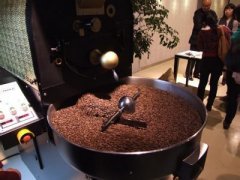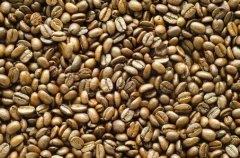A brief introduction to the planting Market Price of Fine Coffee Bean varieties in Yunnan with humid Climate

In view of the obvious characteristics of Yunnan coffee, a typical "export-oriented" agricultural economy and export driven by "quantity", as well as practical problems such as easy to be subject to futures price fluctuations in the international market, imperfect industrial chain, imperfect collection and storage mechanism, it is suggested that: first, give full play to Yunnan's advantages as the main producing area of coffee, establish a national coffee commodity trading center, and gradually form a price mechanism in line with the international futures market. Strengthen the discourse right of Yunnan Coffee International pricing The second is to deepen the level of industrial development, strengthen policy support and guidance, popularize the characteristic operation and management mode of "company + base + cooperative" of Yunnan coffee leading enterprises, and change the traditional decentralized management mode of planting, purchasing and purchasing. Establish a closer interest relationship between farmers and enterprises The third is to further open up the domestic consumption market of coffee, change the single business model of exporting raw materials and relying excessively on the external market, perfect the industrial chain, and at the same time strive to improve and develop the domestic operation and sales model, change the dominant situation of domestic "Starbucks" and other leisure consumer coffee foreign brands, and truly establish China's independent leisure consumer coffee brand.
In 1253 AD, Kublai Khan led his army to cross the golden sand into Yunnan and destroyed Dali. In 1260, he set up the "head of Dali". In 1274, Kublai Khan sent Saidian Chi to support Siding, and in 1276, Yunnan Province was established. Saidianchi was appointed as the "Pingzhang political Affairs of Yunnan Province" (equivalent to today's provincial governor), and the provincial capital Zhongqing Road (Kunming). Since then, Kunming has replaced Dali as the political center of Yunnan, which has completely brought Yunnan into the scope of unified governance of the Yuan Dynasty and opened up a new situation in Yunnan history. Since then, a member of "Yunnan" has officially appeared in history as an institution at the provincial level. Since then, the Yuan Dynasty also first pasted Muer as the king of Yunnan, and in 1290, Ganmala, the imperial grandson of Yunnan, became the king of the province. The king of Yunnan was in the town of Dali, and the king of Liang ruled the whole province. In fact, there were two sets of political power in Yunnan, and Dali Duan took the opportunity to separatize western Yunnan, and the province was in vain.
After the establishment of the Ming Dynasty, Zhu Yuanzhang sent Fu Youde, Lanyu and Mu Ying to march westward to pacify Yunnan in 1381. In 1382, he established the Yunnan Government envoy Division (equivalent to the provincial government) and the Capital Command Division (equivalent to the provincial military region). In the interior of Yunnan, mansions, prefectures and counties were set up to rule mainly by exiled officials, while in remote areas they set up consolation departments, propaganda and comfort departments, long lawsuits and "Yu Yi" prefectures, all under the jurisdiction of the chieftain.
Yunnan is located in the southwest of China, with more than 400000 mu of land in the subtropics, of which the most suitable land area for coffee growth is about 250000 mu, accounting for 21% of the province's land area. Among them, Simao, Xishuangbanna, Baoshan, Lincang, Dehong and other areas are about 6-1200 meters above sea level, the annual average temperature is 18-20 °C, the extreme minimum temperature is above 0 °C, the annual precipitation exceeds 1000mm, and the soil pH is 6-6.5. it is very suitable for the growth of Arabica small grain coffee bean (Coffea Arabica) [Green Arabica Coffee Bean]. Hainan Island is located in the tropics, with a humid climate all the year round, with a land area of 34000 square kilometers and a coastal plain of about 2 pictures. it is an ideal growing environment for coffee beans [Coffea Robusta] in Robusta.
As China becomes richer, coffee culture is springing up in the land of tea drinkers.
Coffee consumption is growing at an astonishing 15% a year, compared with the global average of 2%, according to the London-based International Coffee Organization. This partly stems from the reality that China's starting point is relatively low. The average Chinese drink only three cups of coffee a year, compared with 500 to 700 cups for Americans. However, because of the size of the Chinese market, analysts see great potential.
The rise of coffee in China is due to the spread of western coffee culture. An international brand opened its first coffee shop in China 10 years ago and now has 390. Young white-collar workers like to find a quiet place to read or hang out with friends. The manager thinks that the environment there is an ideal place to do business. "it's a good place to sit down and talk," said du Yuan, 25, who works for a consulting firm in Beijing. " He goes to the coffee shop two or three times a month.
First, the market share of major exports has dropped sharply. In 2013, Yunnan exported 34000 tons and 590 million yuan of coffee to the European Union, down 17.3% and 18.1% respectively, accounting for 68% of the province's coffee exports, down from 76.3% in the previous year, with exports to Germany, France and other major consumer countries falling by 22% and 16.8% respectively. In the first two months of 2014, the value of the province's coffee exports to the European Union continued to decline by 1% and 3.8%.
Second, both general trade and bonded exports have declined. In 2013, the province's general trade exports of coffee totaled 39000 tons and 680 million yuan, down 21.4% and 22.2% respectively, while the value of exports in special customs supervision areas increased from 4599 tons and 68.2 million yuan in the previous year to 15000 tons and 190 million yuan respectively. In the first two months of 2014, the value of coffee exports from the province's general trade continued to decline by 7.5% and 10.1%, while the value of exports from special customs supervision areas also dropped sharply by 43.5% and 39%, respectively.
Third, the value of exports from the main coffee producing areas has decreased significantly. In 2013, Yunnan Simao exported coffee worth 14000 tons and 260 million yuan, down 10.2 percent and 11 percent respectively in the first two months of 2014, while exports worth 2848 tons and 42.56 million yuan continued to decline by 35.4 percent and 49.7 percent, respectively. Dehong, another major coffee producing area in the province, had a coffee export value of 2223 tons and 28.38 million yuan in the first two months, which also dropped sharply by 43.5% and 43.7%.
Important Notice :
前街咖啡 FrontStreet Coffee has moved to new addredd:
FrontStreet Coffee Address: 315,Donghua East Road,GuangZhou
Tel:020 38364473
- Prev

A brief introduction to the history and culture of the origin and development of Yunnan boutique coffee beans
At the same time, in order to cope with the rise and fall of coffee prices, the provincial coffee industry association also called for the establishment of a coffee storage system in Yunnan, by subsidizing warehousing fees and providing discount loans. support coffee enterprises to store coffee beans at protective prices when the selling price is close to or lower than the planting cost, so as to promote the long-term health of the coffee industry. We have decided to break this practice this year.
- Next

A brief introduction to the cultivation of high-yield high-quality coffee beans in Yunnan, geographical location, climate and altitude
However, it does not mean that you have not had a cup of good Yunnan coffee, and if the post-processing and baking is good, as a friend said here, the coffee from several hills, such as Pu'er Manlaojiang, Kaddura of Manzhong Tian, Tielka of Baihualing of Lujiang, Baoshan, and Bourbon of Lujiang, Baoshan, is still good, especially resistant. The old varieties of Yunnan coffee at 1800m above sea level are currently supplied to the domestic market by 30%, 70%.
Related
- Detailed explanation of Jadeite planting Land in Panamanian Jadeite Manor introduction to the grading system of Jadeite competitive bidding, Red bid, Green bid and Rose Summer
- Story of Coffee planting in Brenka region of Costa Rica Stonehenge Manor anaerobic heavy honey treatment of flavor mouth
- What's on the barrel of Blue Mountain Coffee beans?
- Can American coffee also pull flowers? How to use hot American style to pull out a good-looking pattern?
- Can you make a cold extract with coffee beans? What is the right proportion for cold-extracted coffee formula?
- Indonesian PWN Gold Mandrine Coffee Origin Features Flavor How to Chong? Mandolin coffee is American.
- A brief introduction to the flavor characteristics of Brazilian yellow bourbon coffee beans
- What is the effect of different water quality on the flavor of cold-extracted coffee? What kind of water is best for brewing coffee?
- Why do you think of Rose Summer whenever you mention Panamanian coffee?
- Introduction to the characteristics of authentic blue mountain coffee bean producing areas? What is the CIB Coffee Authority in Jamaica?

